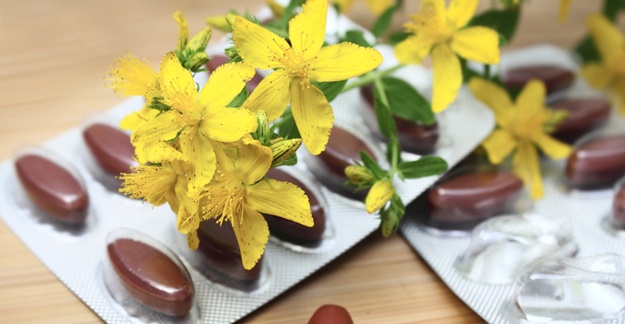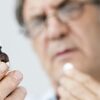Browse This Article
St. John’s wort is a popular herbal supplement used especially for depression. But does it actually work and what drugs might it interact with?
In my 20s, I wasn’t much for traditional medicine. For one thing, navigating our labyrinthine health care system seemed like a lot of unnecessary work. For another, I was broke. Plus, I used henna to dye my hair. I wanted something natural.
That meant that when I felt down in the winter and was quick to worry and anxiety, I didn’t go to the doctor. I went to the drug store and got myself a bottle of St. John’s wort (Hypericum perforatum).
By the time I started taking St. John’s wort around 2003, the plant had been used to rid the environment of evil spirits in ancient Greece and medicinally to menstrual cramps, heal wounds, and treat kidney conditions in laterherb
side
centuries. Today, it’s primarily used to treat depression.
What those early practitioners didn’t know and what I didn’t, either, was that St. John’s wort can interact with prescription medicines in ways that can be serious. With everything from hormonal contraception to organ-transplant drugs interacting with the supplement, the more you know about the interactions, the better off you are.
Powerful or Placebo
In 1998, St. John’s wort was the second most popular supplement in the US, according to the nonprofit supplement industry group the American Botanical Council.
That’s when I first heard about it. But what I didn’t know was that, 4 years earlier, passage of the Dietary Supplement Health and Education Act created the category of dietary supplements and prevented the FDA from requiring supplement companies to prove their products were safe, certify levels of active ingredient or produce evidence that they work.
So, I was working with spotty knowledge. I wasn’t the only one.
Research on St. John’s wort was positive early on, but over the years, the findings have been more muddy, said D. Craig Hopp, PhD, deputy director of the Division of Extramural Research, National Center for Complementary and Integrative Health (NCCIH), part of the National Institutes of Health (NIH) . St. John’s wort seems to be associated with a “strong” reduction in depressive symptoms, including lack of interest in once-pleasurable activities, sleep or eating changes, hostility, irritability, and feelings of guilt, worthlessness or helplessness.
“But you get the same response from the placebo,” he said. “It’s not real clear whether it has [any] benefit.”
A 2002 NCCIH-funded study found that neither St. John’s wort nor the antidepressant tested was any more powerful than placebo for major depression. Another study found the same for mild depression.
On the other hand, a 2008 Cochrane review of 29 studies on the herb found that St. John’s wort is as effective as antidepressants in ameliorating mild to moderate depressive symptoms. But there was a catch: In countries where supplements are regulated and prescribed, the results were more positive. Studies conducted in the US had less positive results.
In any case, Hopp added, “St. John’s wort by itself is safe. But when taken in combination with something else, it dramatically influences how well those medicines work.”
Multiple Interactions caused by St. John’s Wort
That’s because when you’re taking a whole-herb supplement, you aren’t just getting whatever the active ingredient of the herb is — you’re getting everything else that comes with it, too.
It’s unclear what St. John’s wort’s active ingredient is, though researchers have studied 2 components, hyperforin and hypericin. What researchers do know is that St. John’s wort also delivers significant doses of enzymes that help the body break down medications.
Any drug that is broken down by these particular enzymes breaks down a lot faster than it would otherwise. Drugs include the heart medication digoxin, the opioid oxycodone, some HIV medications, cancer drugs like irinotecan, cyclosporine for organ transplants, and the anticoagulant warfarin. That means that the medication exits the body more rapidly.
In the case of HIV medications, that could mean that the virus mutates and develops resistance to the drug so it never works as well again. In the case of heart medicines, it can increase the risk of a cardiac event.
And in the case of organ transplants, it can be fatal.
“Studies have shown that St. John’s wort would clear immunosuppressive medicines 10 times faster,” Hopp said, “That could cause organ rejection and organ failure.”
Plus, because St. John’s wort is unregulated, you don’t know exactly how much active ingredient you’re getting. That limits doctors’ ability to adjust dosages to accommodate St. John’s wort use, said Austin De La Cruz, PharmD, BCPP, a clinical pharmacist who treats mental health disorders. In addition, he teaches psychiatric treatment and over-the-counter medications at the University of Houston College of Pharmacy.
“It is definitely a gamble,” he said. “If you’re taking St. John’s wort with digoxin and switch to a different St. John’s wort brand that has lower amounts of active ingredient, that can lead to significant toxicity with digoxin.”
Birth Control and St. John’s Wort
Notably, since the majority of people reporting depressive symptoms are women, These herbal supstances seems to break down the contraceptive hormone ethinyl estradiol, a component of most estrogen-containing birth control, about twice as fast as when it is taken alone.
“There were also a number of unintended pregnancies because women taking oral birth control were not getting effective doses,” Hopp said of studies on the topic. “This isn’t fatal [the way organ failure is] but it is still a serious adverse event.”
Treating Accurately
For De La Cruz, all of this makes it hard for him to recommend St. John’s wort. He also pointed to a ban on sale of St. John’s wort in France and Ireland, and careful regulation in other countries as evidence of concern.
If people are interested in non-pharmacological approaches to depression, he recommends therapy. Cognitive behavioral therapy has been found to be more effective than antidepressants alone, he said, and carries no risk of side effects.
Then he’ll make sure patients are trying everything that drugs can’t address — like exercise, food and sleep habits — and light therapy lamps if the depression is seasonal.
“It’s important to identify if the depression can be managed by self-care,” De La Cruz said. For instance, a patient may only come in when they feel depressed, but they may also have bouts of mania. Using only St. John’s wort or an antidepressant could exacerbate manic episodes in bipolar disorder.
Besides, he said, 800,000 people die by suicide related to depression every year.
“Depression is a serious illness,” he said. “I have a hard time recommending this herb.”
NCCIH’s Hopp was less absolute. If you don’t take any of the medications that interact with St. John’s wort, its risk is essentially zero. But because it interacts with so many medications, people should tell their doctors they are taking it.
“It’s not that you can’t take it ,” he said. “But it warrants a high level of extra care.”







